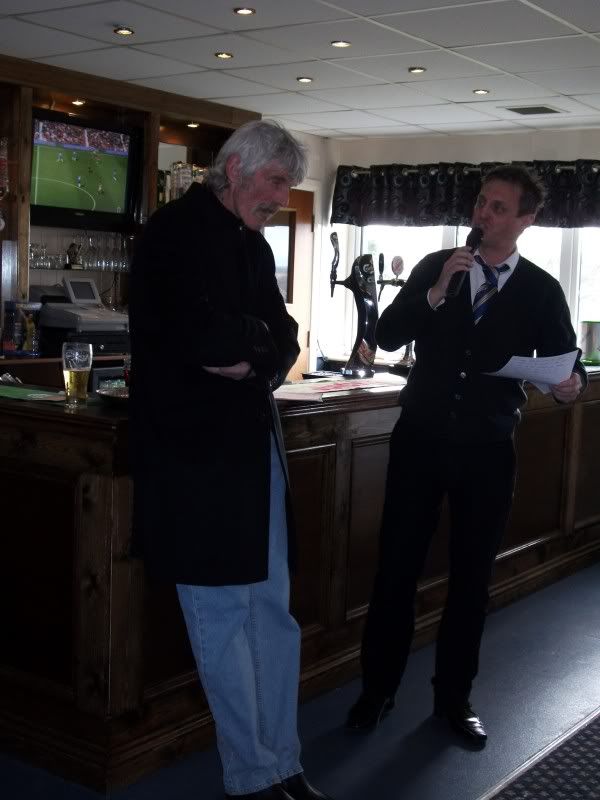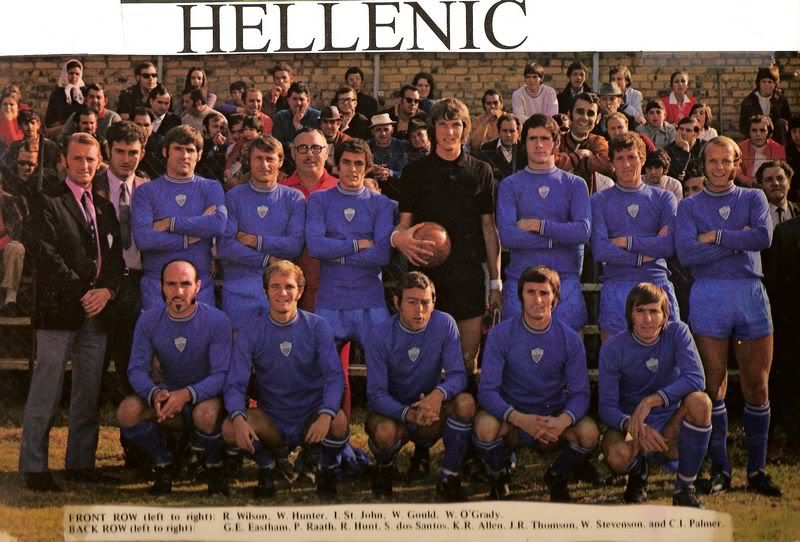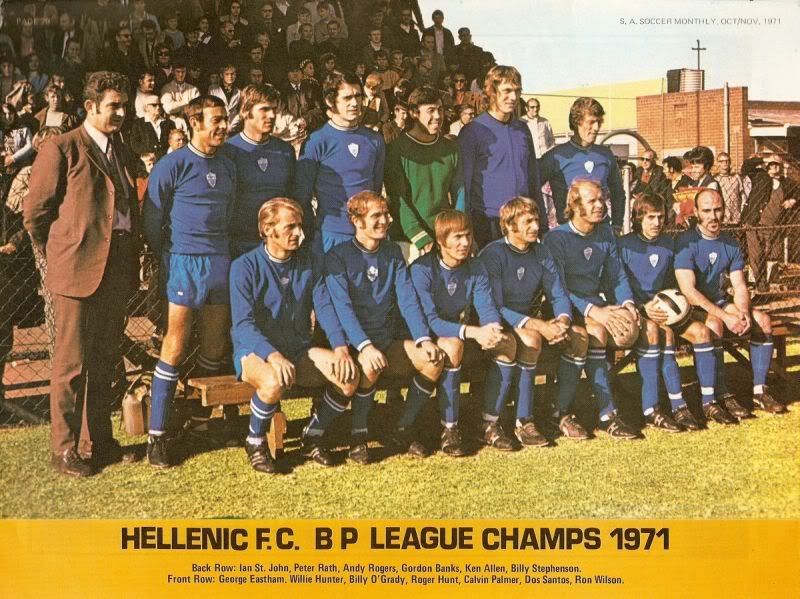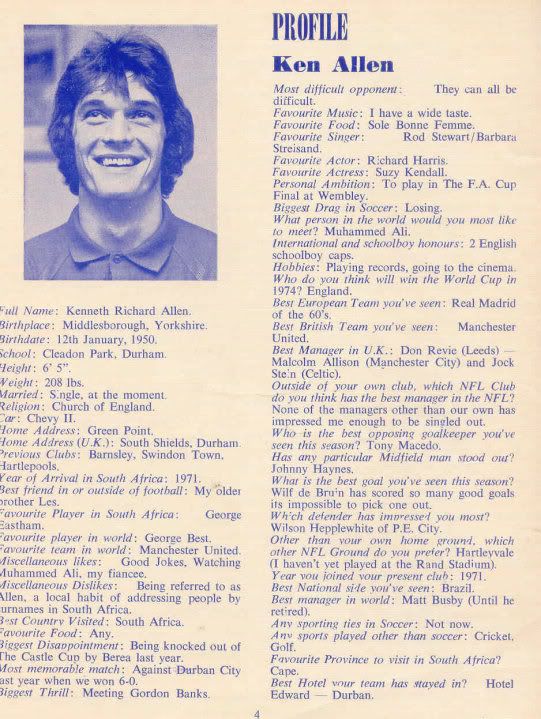Jon
Admin 
Posts: 6,912
|
Post by Jon on Apr 9, 2010 18:25:24 GMT
I had the pleasure yesterday to be able to spend some time chatting with a man who while he towered over my 5 foot four and a HALF inch frame, never made me feel intimidated by his great height. Here was a man who is softly spoken and makes you feel he is happy to listen to you and that he is happy to spend some time talking to you and he himself has so many wonderful and interesting stories to tell about his life in the game. He is writing a book and so far it has got over 30.000 words and he is still writing about his days as a Bournemouth player and its going to be a great read for all Torquay United fans. He once played with George Best and also Dennis Law in a game at Old Trafford and did you know he has played in all the stadiums being used in this years world cup, not the brand new ones, but the ones that have been there for many years now. I’m not a book reader myself, but I do find the stories Kenny has to tell are so interesting and I’m sure there will be some in the book that will blow your mind away about things that has happened at clubs he has played for. Its a book I plan to buy and look forward to reading.  I thought it would be worth copying this into a thread into the History Room. It was interesting to hear Kenny talk about his career – particularly the big gap in his Football League career between playing for Hartlepool as a teenager in 1969 and re-emerging at Bournemouth in 1978. His League debut v TUFC is discussed here: torquayfansforum.proboards.com/index.cgi?board=tufchistory&action=display&thread=2134I was aware that Kenny had spent some time in South Africa but did not know what a successful and high-profile career he had out there until a few clues he mentioned set me off on Google – and as always it is amazing what football info you can find with a little digging. There is a site which has loads of information on South African football in the 60s and 70s: expro.co.za/index.htmlKenny played for Hellenic under player-manager George Eastham – the Stoke and former England midfielder. Eastham is most famous for being the man who ended the medieval "retain-and-transfer" system that clubs shackled footballers with after he challenged through the courts Newcastle’s right to hold onto his registration in an unsuccessful attempt to stop him signing for Arsenal. Amongst Kenny’s team-mates at Hellenic were three of the great Liverpool team which won two Championships and an FA Cup – Ian St John, Willie Stevenson and World Cup winner Roger Hunt. Kenny missed a handful of games when Hellenic brought in a keeper on loan. I would imagine he would not have been best pleased if the keeper in question had been anyone other than the best goalie in the world – Eastham’s Stoke team-mate Gordon Banks. Here are a couple of Hellenic team photos from 1971 – one containing a legendary goalkeeper and the other containing two legendary goalkeepers.   Hellenic actually won the South African League in 1971. Eastham went back to Stoke afterwards, where he and Banks were part of Stoke’s “Dad’s Army” team that beat Chelsea to win the League Cup in 1972. When Kenny was ready to come back to England, Eastham recommended him to his ex-Arsenal team-mate Don Howe who was now the manager at West Brom. This was in December 1972 – around the time that Frank O’Farrell was getting the sack at Manchester United. Kenny never made the first team at West Brom, but played regularly for the reserves in the Central League – at a time when reserve team football was more highly regarded than now, with games at proper grounds on Saturday afternoons. Kenny mentioned that one of the best players he ever played against was Dennis Law and that he played in one of Dennis’s last ever games at Old Trafford before he left to join Manchester City in the 1973 close season. This would tie up in that Law fell out with new manager Tommy Docherty and so would have been in the Central League team which would have played West Brom in the second half of the 1972/73 season. The best player that Kenny ever played with was George Best who turned up at Bournemouth in 1983 – not particularly fit, but still a total genius. |
|
|
|
Post by frankfurt gull on Apr 9, 2010 19:47:50 GMT
great stuff jon, just remind me about that bit about george best and bournemouth in 1983, brains going with old age!
|
|
Jon
Admin 
Posts: 6,912
|
Post by Jon on Apr 11, 2010 8:34:30 GMT
|
|
Jon
Admin 
Posts: 6,912
|
Post by Jon on Apr 11, 2010 8:35:46 GMT
great stuff jon, just remind me about that bit about george best and bournemouth in 1983, brains going with old age! Best signed for Bournemouth towards the end of the 1982/83 season and played five League games for them. |
|
Deleted
Deleted Member
Posts: 0
|
Post by Deleted on Apr 11, 2010 20:34:15 GMT
Great stuff, Jon, on Kenny's South African career. A slightly difficult subject, of course, because it was a whites only league at a time when South Aftrica was suspended from FIFA prior to being expelled in 1976. The league had been going since 1959 and continued to 1978 when it merged with the non-white National Professional Soccer League (in other words a football league for whites; a soccer league for non-whites). As Kenny's Hellenic side were winning their league in 1971, Orlando Pirates were winning the NPSL.
|
|
|
|
Post by aussie on Apr 12, 2010 18:43:05 GMT
I was talking to Kenny Allen after the game on Sunday, whilst he regained normality with a Marlbro, he said he conciously tried to not dive for the ball but his natural reactions were to dive and smother the ball and did himself no favours at all and was so glad he had booked today off work to recover! Top bloke just like the other Kenny who had time to thank me for coming alone to helping out as well as do the groundsman work, two goalkeeping legends and two great men both called Kenny and both Torquay through and through!
|
|
Jon
Admin 
Posts: 6,912
|
Post by Jon on Apr 15, 2010 20:18:00 GMT
Great stuff, Jon, on Kenny's South African career. A slightly difficult subject, of course, because it was a whites only league at a time when South Aftrica was suspended from FIFA prior to being expelled in 1976. The league had been going since 1959 and continued to 1978 when it merged with the non-white National Professional Soccer League (in other words a football league for whites; a soccer league for non-whites). As Kenny's Hellenic side were winning their league in 1971, Orlando Pirates were winning the NPSL. Yes. You can't really mention 70s South Africa without mentioning apartheid - although I had a damned good try, didn't I? I think I found the topic interesting in that it is a bit of hidden history. The NASL is widely documented, but the NFL is a bit of a "dirty secret". I certainly didn't want to condone apartheid, but neither did I want to sound overly critical of footbllers who I fully expect only wanted to play football. Indeed, this kind of attitude in sportsmen can actually help to break down rather than reinforce all sorts of bigotry and discrimination. I'm pretty sure that SA sport started to make steps towards racial integration in the 70s - well before the rest of SA society started the process. That may well have been helped by boycotts but it could well have happened anyway - just as the first steps at eroding class-segregation in this country a hundred years earlier took place on cricket and football pitches. |
|
Deleted
Deleted Member
Posts: 0
|
Post by Deleted on Apr 17, 2010 8:08:38 GMT
I think I found the topic interesting in that it is a bit of hidden history. The NASL is widely documented, but the NFL is a bit of a "dirty secret". Several other Torquay United players had spells in South Africa during the late 1960s and early 1970s: Ron Barnes, Andy Donnelly, Jimmy Dunne, John Rowlands, Alan Skirton and maybe others. I don't remember the NFL causing too much of a furore at the time. This might have been because it was an entirely internal competition that was mainly the preserve of English-speaking whites (and, I believe, migrants to South Africa from Mediterranean Europe). This put it in contrast to cricket and rugby which South Africa played internationally to the delight of its Afrikaaner-speakers. Consequently the political focus - especially after the D'Oliveira affair of 1968/69 - was very much on those sports dear to the Afrikaaners. I also seem to remember a degree of sympathy for the NFL because it was played by "our" people (an intriguing concept). From memory - and certainly from attitudes held by the adults around me - many people in 1960s Britain seemed to view South Africa purely as a land populated by English-speaking whites who had fought on our side during the war. The degree of our ignorance then astonishes me now. Jon's point about the move towards multi-racial sport in the 1970s reminds me of a planned rugby tour in the late 1970s based on a squad of eight white, eight coloured and eight black players. This was widely seen as a sop at the time and I'm not sure if the tour even took place. I believe one of the fixtures was to be played against Devon at Torquay. 1978 perhaps? |
|
Jon
Admin 
Posts: 6,912
|
Post by Jon on Apr 22, 2010 0:00:23 GMT
Jon's point about the move towards multi-racial sport in the 1970s reminds me of a planned rugby tour in the late 1970s based on a squad of eight white, eight coloured and eight black players. This was widely seen as a sop at the time and I'm not sure if the tour even took place. I believe one of the fixtures was to be played against Devon at Torquay. 1978 perhaps? I don't know much about rugby, but it would not surprise me. I know that as cricket integrated in the 70s, the "SA XI" teams always used to include a couple of non-whites even though they obviously weren't up to the required standard. I'm sure I have even heard in the last year or so of a non-white cricketer being selected for the SA Test team above a white cricketer of a higher standard to avoid having an all-white team. I suspect that soccer never needed quotas or sops because it was the game of the people and there would not have been a gulf in class between races based on lack of equipment or coaching. If you picked the best eleven South African footballers, the team would automatically include a lot of non-whites - unlike cricket or rugby. I did liken racial segregation in SA starting to be broken down by sport to class segregation starting to be broken down by sport in the UK a century earlier. Maybe, I should have said by football rather than by sport in general. Even today, I think cricket and rugby still have a bit of "classism" about them that doesn't exist in football and hasn't for a long time. When did the "Gentlemen v Players" cricket matches stop? Are games played by sub-standard Oxford and Cambridge University teams still classed as "First Class"? |
|




